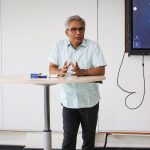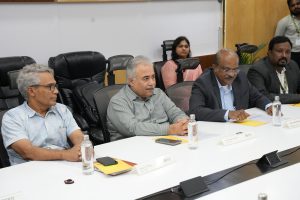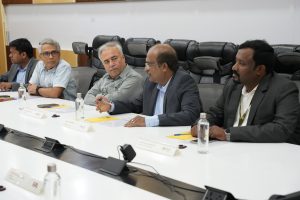All Management Events
- Chetna: Awakening Mathematical Minds July 4, 2024
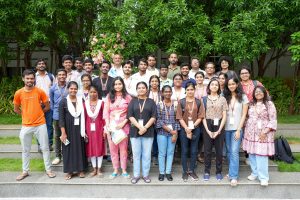 The Department of Mathematics at SRM University-AP successfully conducted a two-week summer programme “Chetna: Awakening Mathematical Minds” from June 17th to June 28th, 2024. This programme aimed to inspire and enhance mathematical understanding among participants from various parts of the country. The programme saw enthusiastic participation from 25 students hailing from different states across India, including West Bengal, Assam, Kerala, Karnataka, Tamil Nadu, Maharashtra, Gujarat, Delhi and Andhra Pradesh.
The Department of Mathematics at SRM University-AP successfully conducted a two-week summer programme “Chetna: Awakening Mathematical Minds” from June 17th to June 28th, 2024. This programme aimed to inspire and enhance mathematical understanding among participants from various parts of the country. The programme saw enthusiastic participation from 25 students hailing from different states across India, including West Bengal, Assam, Kerala, Karnataka, Tamil Nadu, Maharashtra, Gujarat, Delhi and Andhra Pradesh.The programme featured a diverse curriculum, covering a wide range of mathematical topics. Eleven subjects were taught by eleven distinguished faculty members from the Department of Mathematics. The subjects provided a broad and enriching mathematical experience, designed to ignite a passion for mathematics in the participants.
Insights of the Two-Week Programme
First Week Highlights
1. Number Theory by Prof. Kalyan Chakraborty
The first week began with an in-depth exploration of Number Theory. Prof. Kalyan Chakraborty introduced participants to fundamental concepts such as divisibility, prime numbers, and modular arithmetic. The engaging sessions provided a strong foundation in understanding the properties and applications of numbers.2. Abstract Algebra by Dr Anirban Bose
Dr Anirban Bose led the sessions on Abstract Algebra, diving into structures like groups, rings, and fields. The course covered essential algebraic concepts and their applications, enhancing the participants’ problem-solving skills and theoretical knowledge.3. Linear Algebra and Basic Operators by Dr Animesh Bhandari
Dr Animesh’s lectures on Linear Algebra included topics such as vector spaces, linear transformations, and matrices. The sessions aimed to build a solid understanding of linear systems and the role of operators in mathematical computations.4. Graph Theory by Dr Fouzul Atik
Graph Theory, taught by Dr Fouzul Atik, introduced participants to the study of graphs, which are mathematical structures used to model pairwise relations between objects. Topics included graph traversal, connectivity, and graph colouring, providing insights into the practical applications of graph theory.5. Ordinary Differential Equation by Dr Nityananda Roy
The week concluded with Dr Nityananda Roy’s sessions on Ordinary Differential Equations (ODEs). This course covered methods of solving first-order and higher-order ODEs, along with real-world applications of differential equations in various fields.Second Week Highlights
1. Advanced Algebra by Dr Kalyan Banerjee
Building on the first week, this subject delved deeper into algebraic structures, including advanced group theory and ring theory, preparing students for research-level problems.2. Metric Spaces by Dr Choiti Bandyopadhyay
Dr Choiti’s sessions on Metric Spaces introduced participants to the concepts of distance and convergence in metric spaces. Topics included open and closed sets, continuity, and compactness, providing a deeper understanding of analysis.3. Foundations of Probability and Statistics by Dr Vijayakrishna Rowthu
Dr. Vijayakrishna covered the Foundations of Probability and Statistics, focusing on probability theory, random variables, and statistical inference. The course aimed to equip participants with the skills needed to analyze and interpret data.4. Mathematical Modelling by Dr Tapan Kumar Hota
Dr. Tapan’s lectures on Mathematical Modelling demonstrated how mathematics can be used to represent, analyse, and solve real-world problems. The course included case studies and practical applications in various disciplines.5. Partial Differential Equation by Dr Ram Baran Verma
The sessions on Partial Differential Equations (PDEs) by Dr Ram Baran explored methods of solving PDEs and their applications in physics and engineering. Topics included separation of variables, Fourier series, and boundary value problems.6. Math Education by Dr Jayasree Subramanian
The final course on Math Education, taught by Dr Jayasree, focused on pedagogical approaches and techniques for teaching mathematics effectively. The sessions aimed to inspire future educators and enhance their teaching methodologies.Conclusion
Continue reading →
The “Chetna: Awakening Mathematical Minds” summer programme was a resounding success, providing participants with valuable insights and knowledge in mathematics. The diverse backgrounds of the participants and the expertise of the faculty created a vibrant and stimulating learning environment, fostering a deeper appreciation for the subject. The Department of Mathematics at SRM University -AP looks forward to organising similar programmes in the future to continue inspiring young mathematical minds across the country. - SRM AP Signs MoU with Human Resocia to Create Employment Opportunities in Japan for Students July 4, 2024
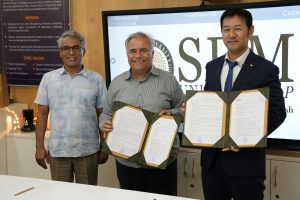 SRM University-AP has signed an MoU with Human Resocia to facilitate employment and job opportunities for university students in Japan. This collaborative agreement partners HR to provide all the necessary facilities required for students to pursue career opportunities in Japan.
SRM University-AP has signed an MoU with Human Resocia to facilitate employment and job opportunities for university students in Japan. This collaborative agreement partners HR to provide all the necessary facilities required for students to pursue career opportunities in Japan.The MoU signing ceremony, organised yesterday, was honoured by esteemed individuals, including Prof. Manoj K Arora, Vice Chancellor of SRM University-AP, Dr M S Vivekanandan, Director of CRCS, Prof. C V Tomy, Dean SEAS, Mr Laxmanan Angu Raju, AGM of CRCS, Mr K Jotish Kumar, CEO of SRM Global, along with representatives from Human Resocia (HR) such as Mr Takeshi Tominaga, Mr Yuji Sakaguchi, Mr Taketo Fukuda, Mr Kagotani Takuya, and Mr Senthil Sellappan.
This Alliance between SRM University-AP and HR will primarily focus on recruiting students, providing Japanese language learning for recruitment in Japan as well as to identify opportunities where both entities can collaborate with Japanese universities or other relevant stakeholders of Japan be it academic or industry. With a goal to develop the employability and cross-cultural learning experience of students, this collaboration is all set for mutual growth and development.
Prof. Manoj K Arora, Vice Chancellor of SRM University-AP, expressed his enthusiasm: “This strategic partnership with Human Resocia marks a milestone in our efforts to provide international career opportunities for our students in Japan. We are very excited about the prospects that this MoU brings, and we are committed to preparing our students for successful careers ahead.”
Human Resocia Co., Ltd. is a recruiting and dispatch company in Japan that has been established for more than 30 years. It specialises in helping individuals develop their careers as IT engineers in the nation. Their rich experience in understanding the evolving needs of job seekers and how to help millions of job seekers and lakhs of recruiters like no one else does makes them a perfect ally, and we are happy that they trust us on this step.
This MoU signifies a significant step towards empowering students of SRM University-AP to begin a promising career path in Japan. It reflects the University’s commitment to providing holistic opportunities for professional growth and international exposure.
Continue reading → - Dr Mohit Aggarwal July 3, 2024
- SRM AP Vice Chancellor Nominated to Prestigious AIU Governing Council July 2, 2024
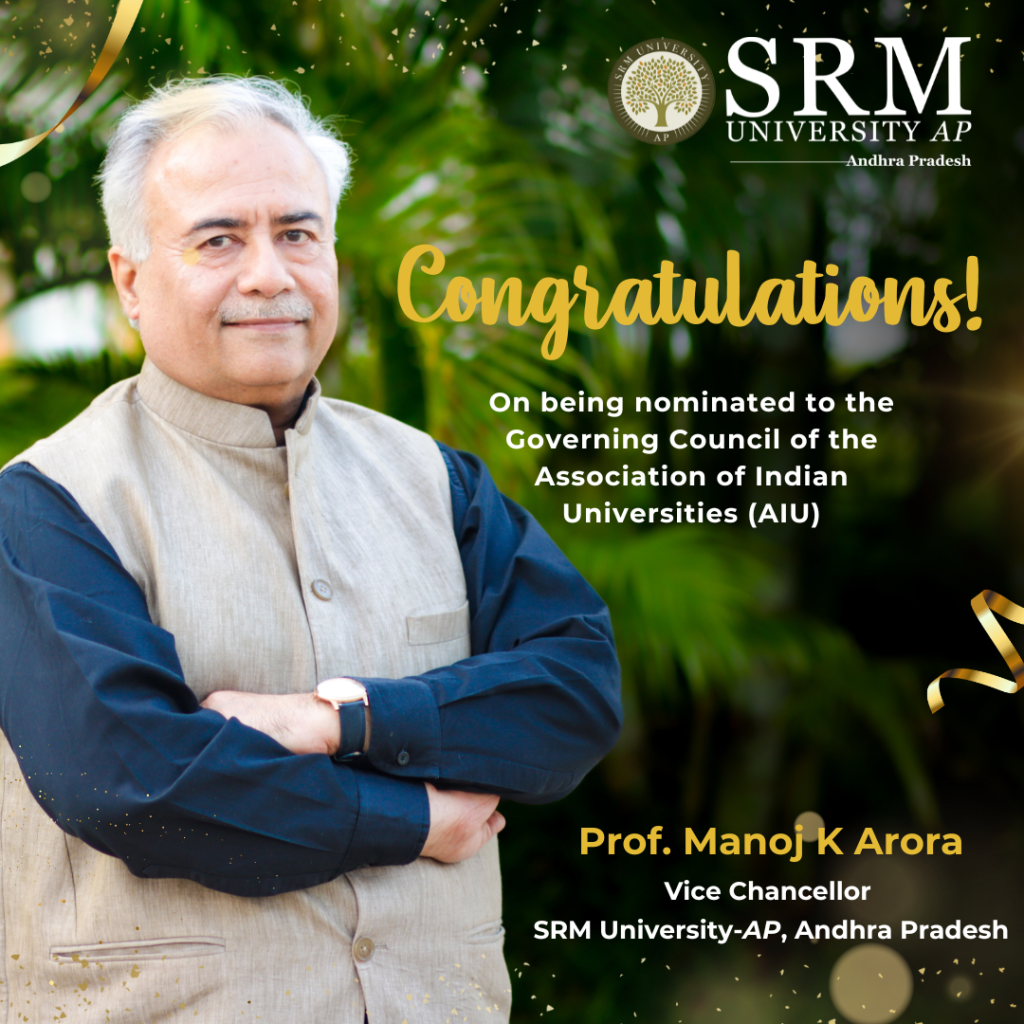 A proud moment for SRM University-AP as it announces the nomination of its esteemed Vice Chancellor, Prof. Manoj K Arora, to the Governing Council of the Association of Indian Universities (AIU). The Association of Indian Universities (AIU) serves as a paramount inter-university organisation actively involved in the advancement and nurturing of higher education.
A proud moment for SRM University-AP as it announces the nomination of its esteemed Vice Chancellor, Prof. Manoj K Arora, to the Governing Council of the Association of Indian Universities (AIU). The Association of Indian Universities (AIU) serves as a paramount inter-university organisation actively involved in the advancement and nurturing of higher education.On accepting this nomination, Prof. Arora remarked, “I am deeply humbled to have been nominated as a member of AIU and look forward to it. This nomination reflects our collective efforts towards advancing higher education and fostering collaboration, thereby working towards changing the face of higher education in India.”
This notable appointment not only recognises Prof. Arora’s outstanding contributions to the academic fraternity but also underscores SRM University-AP‘s commitment to excellence in higher education. The AIU plays a pivotal role in elevating the quality and accessibility of higher education across the nation. The AIU, with its broad membership including international institutions from Bangladesh, Bhutan, Kazakhstan, Malaysia, Mauritius, Nepal, Thailand, the UAE, and the UK, serves as a platform for global educational exchange and development. Its endeavours are directed toward creating a collaborative and innovative educational landscape, making this nomination significant for SRM University-AP and the broader academic community.
Prof. Arora’s nomination is a moment of pride not only for him but for the entire SRM AP fraternity. The university community extends its heartfelt congratulations to Prof. Arora on this noteworthy achievement and eagerly anticipates his ongoing guidance and foresight in steering the course of education in India.
Continue reading → - B.Tech. in Mechanical Engineering: From Da Vinci’s Sketches to Robots July 2, 2024

As you navigate through subjects like Biological Psychology, Social Psychology, and Cognitive Psychology, you’ll gain profound insights into the intricacies of the human psyche. But the allure of a BSc in Psychology extends far beyond the classroom.
With the demand for clinical and counselling psychologists projected to surge by 11% by 2032, this degree opens doors to a multitude of fulfilling career pathways. Whether you aspire to guide individuals through life’s challenges as a clinical psychologist or provide empathetic support as a counselling psychologist, the opportunities are boundless.
You can join this extraordinary academic odyssey, where you’ll not only expand your intellectual horizons with BSc Psychology subjects but also embark on a rewarding journey of personal and professional growth.
BSc Psychology Subjects Lists
Here’s a list of common subjects typically included in a BSc Psychology programme:
Introduction to Psychology
Biological Psychology
Cognitive Psychology
Developmental Psychology
Social Psychology
Abnormal Psychology
Personality Psychology
Statistics for Psychology
Research Methods in Psychology
Psychological Testing and Assessment
Clinical Psychology
Counselling Psychology
Industrial-Organisational Psychology
Health Psychology
Forensic Psychology
Cross-Cultural Psychology
Neuropsychology
Educational Psychology
Positive Psychology
Environmental Psychology
Keep in mind that the specific subjects offered may vary depending on the university and the curriculum structure of the BSc Psychology programme.

BSc Psychology Syllabus
Given below is the year-wise subject and syllabus of BSc Psychology:
Graduates with a Materials and Manufacturing MTech degree can access rewarding and well-paying positions in areas such as,
-
- Aerospace engineering
- Automotive engineering
- Biomedical engineering
– that require expertise in materials and manufacturing technology.
The practical knowledge gained from Materials and Manufacturing MTech studies can help develop new materials for use in production pipelines or create innovative manufacturing processes that streamline production times whilst improving quality control, making the Materials and Manufacturing MTech degree beneficial to the individual graduate and employers alike.
- Surplus Opportunities to Work on Research Projects
Pursuing an MTech degree provides opportunities to work on research projects, which can create networking opportunities and help you hone your skills.
For example, Thermal MTech students get to explore the fascinating field of Thermal engineering, such as Thermal design and Thermal analysis.
They also get to work on projects related to,
-
- Thermal energy management
- Thermal systems design
- Thermal control systems.
- The Bright Side of Thermal Engineering
Working on research projects in Thermal engineering can also give students an edge in the industry as it enhances their understanding of Thermal principles and technologies.
Valuable industry experience and essential connections in the Thermal engineering field through their research work.
All these advantages make pursuing an MTech degree worthwhile for those interested in Thermal engineering.
MTech provides invaluable insight into the latest breakthroughs and technologies in your field, helping you stay ahead of the curve.
Studying for an MTech can provide immense advantages for those in the technological field, particularly IoT technologies. Not only does it offer the opportunity to gain higher qualifications and broaden skills, but it can also provide invaluable insight into the latest IoT breakthroughs and technologies, helping students stay ahead of the curve.
- The Perks of an MTech in VLSI
An MTech in VLSI will allow you to develop advanced knowledge and skills, making a VLSI engineer highly sought after in many industries. As a VLSI engineer, you can work with hardware design, device fabrication, circuit design and debugging, amongst other skills, which will give you a competitive edge over other job applicants.
- Possibilities of the Internet of Things (IoT)

IoT (Internet of Things) related coursework provides students with comprehensive technical and practical insight into IoT systems development. Technical topics like IoT architecture, IoT standards and IoT security are taught in detail, enabling those who complete the program to gain specialised knowledge in the IoT domain.
Furthermore, the programme also typically offers a research-based thesis which enables students to apply their IOT skills to real-world problems. In this way, MTech programmes provide an excellent opportunity for students to understand IoT systems and technologies deeply.
What to Expect From an MTech Degree?
-
- Opportunity to develop their professional skills through hands-on projects and internships
- Opportunity to become experts in Data Science and its associated technologies.
- Data Science is a rapidly evolving field, and an MTech will provide the guidance needed to stay current and be at the forefront of Data Science development.
- Provides students with the ability to gain a deeper understanding of Data Science and its applications, which can help them get better jobs or progress their careers.
Where Will You Be After graduation?
Upon graduation, MTech graduates are highly sought after in the job market, with many top companies offering competitive salaries for those with an MTech degree.
Furthermore, an MTech degree is a tremendous advantage as Thermal graduates are highly sought after in the job market.
Thermal graduates have specialised knowledge, making them more attractive to companies and often offered competitive salaries.
An MTech degree provides Thermal graduates with unique skills and qualifications that make them stand out in the job market and ensure they have a competitive advantage over other applicants.
Making the Most of Your MTech Degree; Yes That’s What Makes the difference!
With an MTech degree, you can pursue a plethora of career options.
What are the Most Coveted Career Options After MTech?
-
-
- Engineering
- Research and development
- Data science
- Materials and Manufacturing
-
- The Scope of Materials and Manufacturing
Materials and Manufacturing are two areas often explored in an MTech course.
-
-
- Provide you with knowledge of materials used in industries and hands-on experience working with them.
- Access to other related fields, such as chemical engineering and robotics.
- Enable you to develop expertise in manufacturing processes, including production planning, cost control and product design.
- On completing the degree, you can embark on a career as a Materials and Manufacturing Engineer with high growth prospects.
- Exclusive job opportunities in the government sector.
-
- The Future of MTech in VLSI
MTech in VLSI empowers students to get VLSI-related roles in the government and even industries like Aerospace, Medical electronics, Automotive industry, etc.
VLSI has become a popular technology due to its versatility in processing large amounts of data without lags. With the proper knowledge and specialised skillset gained through the course, you will be able to face the challenges of a competitive job market more confidently.
What is Stopping You From Grabbing That MTech Degree!
Pursuing an MTech degree can be a rewarding experience. It is an opportunity to gain the skills and knowledge needed to pursue specialised careers in your field of study.
With a vast range of opportunities that come with gaining an MTech degree, it is worth considering if you’re looking for specialised training and education.
With hard work and dedication, you can find great success in your chosen career after completing your MTech degree!
You are just a click away from pursuing your dream MTech Degree!
Continue reading → -
- Mr P Udayaraju July 2, 2024
- Innovating Human Resources: A Blockchain Technology Bibliometric Analysis July 2, 2024
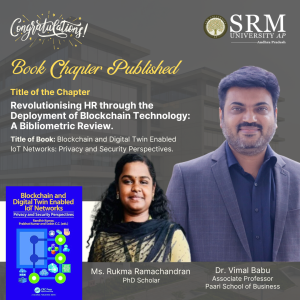 In a significant academic achievement, Dr Vimal Babu, Associate Professor at the Department of Management, Paari School of Business, and Ms Rukma Ramachandran, a PhD Scholar, have co-authored a book chapter titled “Revolutionizing HR through the Deployment of Blockchain Technology: A Bibliometric Review.” The chapter is included in the book Blockchain and Digital Twin Enabled IoT Networks: Privacy and Security Perspectives, published by Routledge: A Taylor and Francis Group.
In a significant academic achievement, Dr Vimal Babu, Associate Professor at the Department of Management, Paari School of Business, and Ms Rukma Ramachandran, a PhD Scholar, have co-authored a book chapter titled “Revolutionizing HR through the Deployment of Blockchain Technology: A Bibliometric Review.” The chapter is included in the book Blockchain and Digital Twin Enabled IoT Networks: Privacy and Security Perspectives, published by Routledge: A Taylor and Francis Group.
The research work delves into the potential of blockchain technology in transforming Human Resources practices, offering a bibliometric review to shed light on the impact and future possibilities within the field.The publication adds valuable insights to the growing discourse on blockchain applications in various industries, particularly focusing on HR management. This collaborative effort between Dr Vimal Babu and Ms Rukma Ramachandran highlights their dedication to exploring innovative solutions at the intersection of technology and management. Their contribution to the book aims to contribute to the ongoing dialogue on privacy, security, and efficiency in IoT networks, with blockchain technology playing a pivotal role in shaping the digital landscape.
The chapter’s publication signifies a notable milestone in the academic pursuits of both scholars, solidifying their expertise and thought leadership in the realm of blockchain technology and its implications for HR practices. Their contribution is expected to resonate with professionals, researchers, and students interested in the evolving dynamics of digital innovation and its impact on organisational processes.Brief Introduction of the Book Chapter
The adoption and implementation of Blockchain in Management have been gaining increasing attention. The rise in the number of studies on Blockchain in managerial applications invites a greater number of research contributions in this field. This chapter describes the gap in the present studies using a hybrid review system through the means of systematic literature review and bibliometric analysis.Publication details (incl. Publisher, ISBN, Launch date, Edition, etc)
Publisher- Taylor & Francis
ISBN- 9781003403791
Launch date- 19 July 2024
Edition- 1stTarget Audience of the Book Chapter
This book emphasizes and facilitates a greater understanding of various data security privacy approaches using the advances in Blockchain and data analysis using machine/deep learning, federated learning, edge computing and the countermeasures to overcome these vulnerabilities.Link to the Book Chapter
Continue reading →
Blockchain and Digital Twin Enabled IoT Networks | Privacy and Securit (taylorfrancis.com) - Dr K V T K N Prashanth July 2, 2024
- Mr Shaik Johny Basha July 1, 2024
- Mr Gavaskar S July 1, 2024








